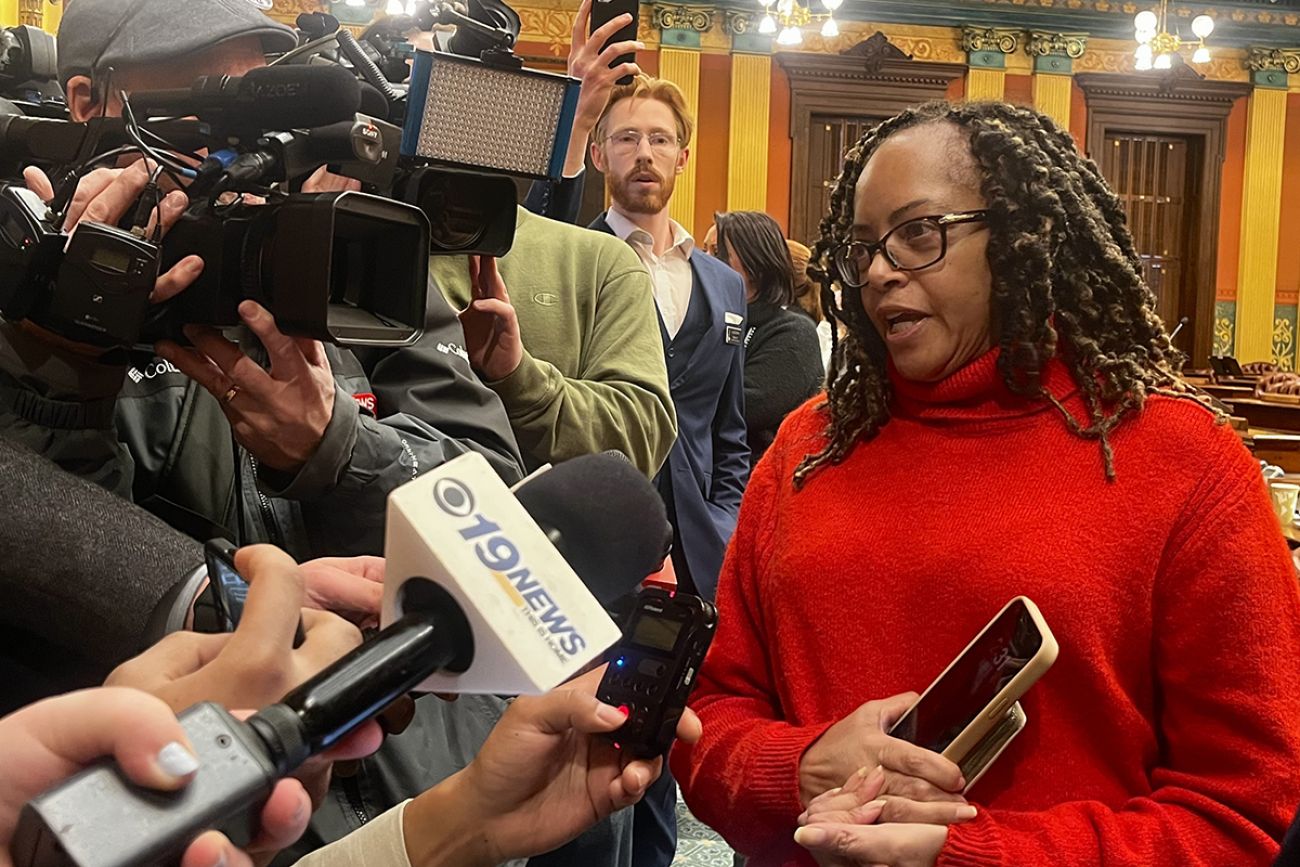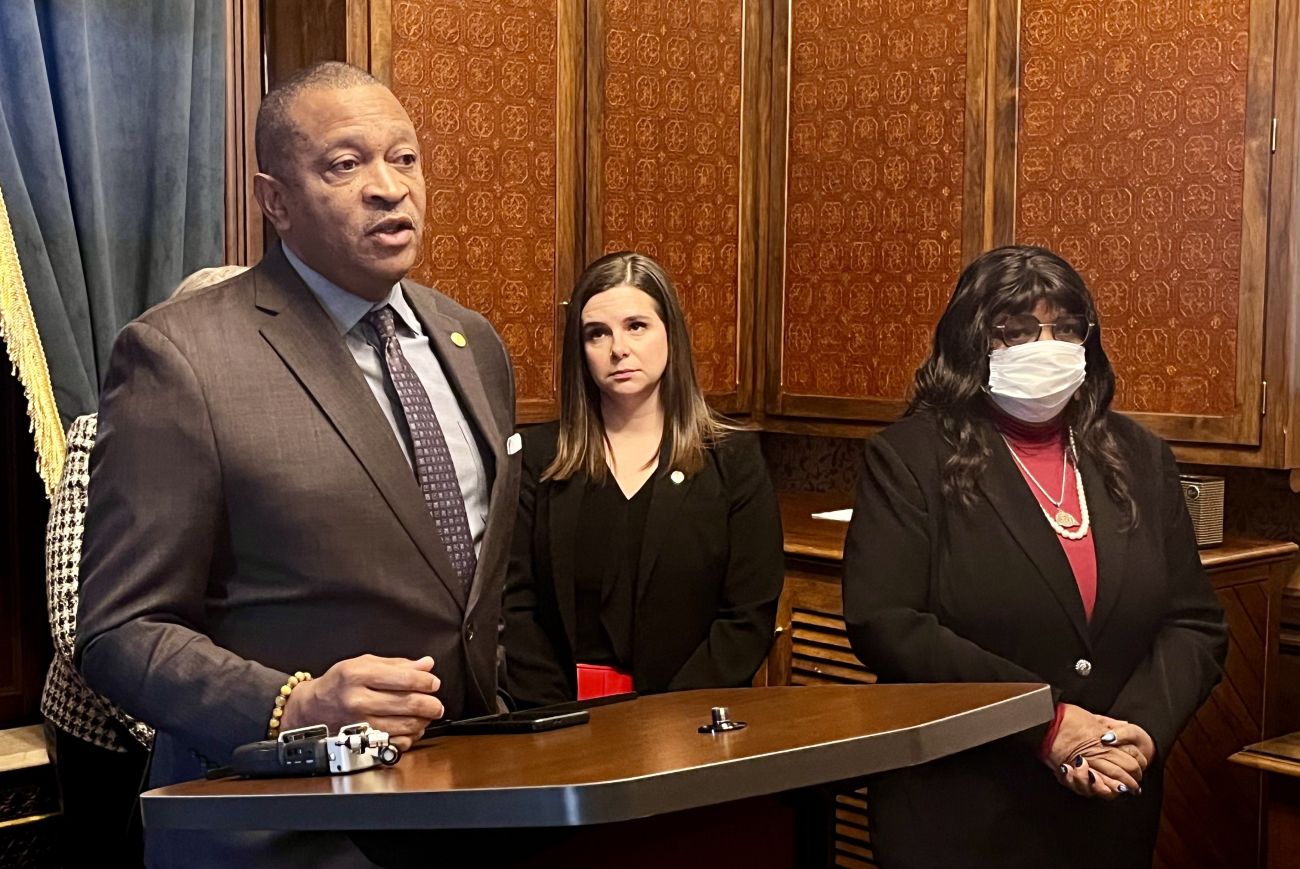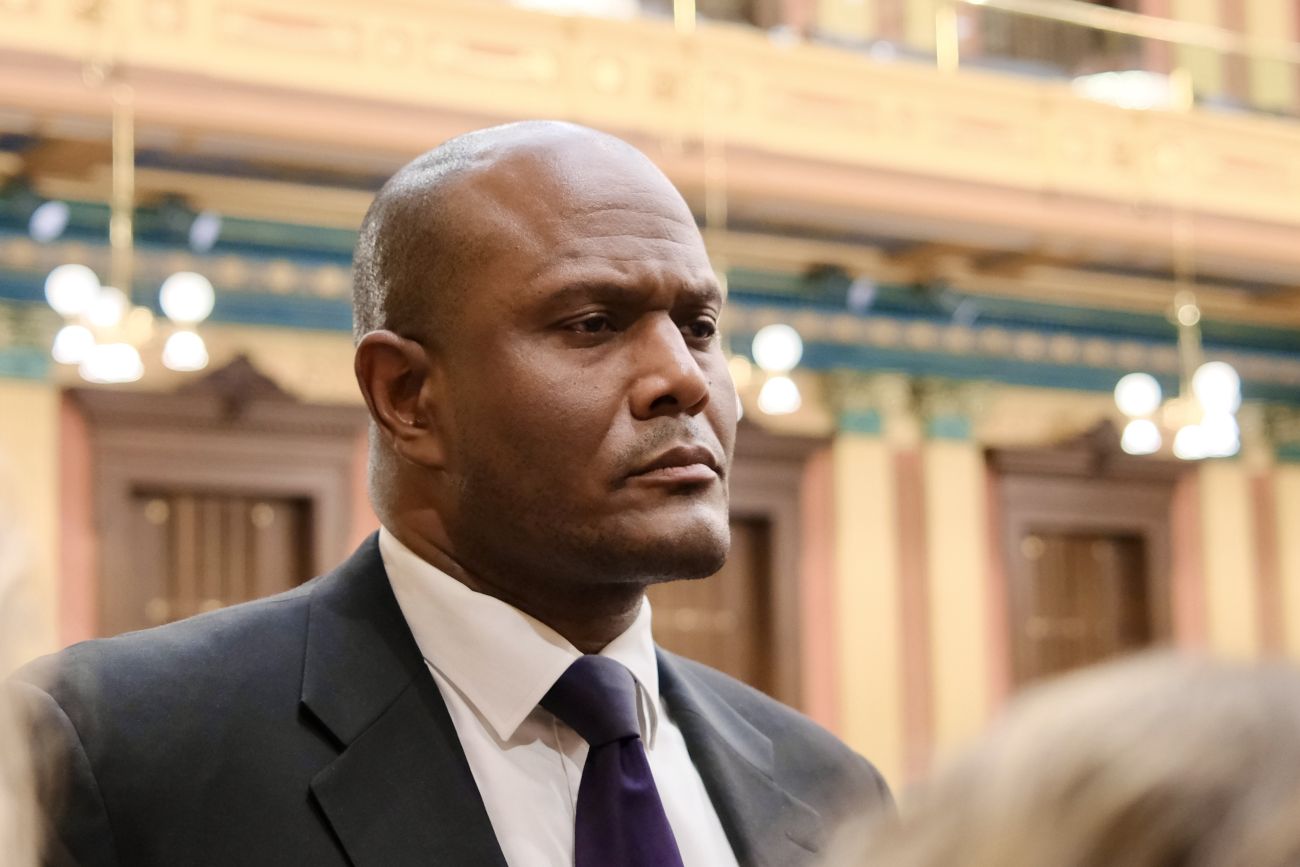Michigan lame-duck Legislature: House ends year with tears, fingerpointing

Last updated: Thursday, Dec. 19 at 4:34 p.m. This post will be regularly updated over the final days of the Michigan Legislature's lame-duck session.
Tears, fingerpointing and cursing reverberated through the Michigan House on Thursday afternoon as leadership adjourned for the year without votes for the second straight day, ending the Democrats’ two-year governing trifecta.
House Speaker Joe Tate, Detroit, pulled the plug after failing to secure votes amid walkouts by all Republicans and Democratic state Rep. Karen Whitsett, who on Thursday returned to the Capitol — but not the House floor.
Though staff announced the House would reconvene at 1:30 p.m. Dec. 31, House Speaker Pro Tem Laurie Pohutsky, D-Livonia, told reporters that was only so she could officially end the legislative session for the year at that time.
"Everything that was on the agenda today in the House is dead, and the 55 members that did not attend should feel free to own that,” Pohutsky said, tears in her eyes.
Related: Michigan House kills hundreds of bills. See what died on final day of Dem control
Her frustration was shared by other lawmakers in the chamber after multiple days of legislative stagnation.
Neither Whitsett nor Democratic Sen. Sylvia Santana, both representing Detroit, attended session on Wednesday. Both told reporters they felt Michigan’s Black communities were not being paid enough attention to, and their priorities had fallen to the side in favor of pushing corporate incentives.
House Republicans began their boycott last week, demanding Democrats take up bills addressing the state’s pending minimum wage, sick leave and tipped wage changes in 2025.
Whitsett, explaining why she did not return to the floor Thursday, alleged Tate “would not negotiate in good faith.”
She and House Speaker-elect Matt Hall, R-Richland Township, took questions from reporters following Thursday’s session.
“They told me, they promised me, they weren’t going to lock me in here and that’s exactly what they did,” Whitsett said, referring to Tate’s decision to issue a “call of the House,” an order for sergeants to bring lawmakers back to session and bar the chamber doors.
“I can’t believe the Speaker of the House, Joe Tate, is so heartless and wanted me to push the button for bills that he knows have not been vetted,” she said.
Hall accused Democrats of “trying to bait” Whitsett into returning to the House for a vote on a water affordability package, something she’d long sought, despite not having enough support to pass the measure.
Tate did not speak with reporters after session.
But Rep. Abraham Aiyash, majority floor leader and a Hamtramck Democrat, pushed back against Whitsett’s claims. He said leadership never told Whitsett water affordability would pass, and that one Democrat — newly elected state Rep. Peter Herzberg of Westland — “had no interest” in the proposal.
“Quite frankly, it became a point where there was no more logic in some of the things that were brought up … We were working at every possible turn to secure those votes, but there was no guarantee that it was going to move,” Aiyash said.
Hall, however, was skeptical, saying: “This whole lame duck, Joe Tate has not had a plan.”
Whitsett took that a step further.
“The whole two years he hasn’t had a plan.”
—Jordyn Hermani
House abruptly adjourns after days of dysfunction
Thursday, Dec. 19
The Michigan House abruptly adjourned Thursday afternoon, roughly one hour after Speaker Joe Tate of Detroit had ordered sergeants to bring missing members back to session.
The surprise decision capped days of dysfunction in the chamber, where Republicans walked out last week, and Democratic Rep. Karen Whitsett followed suit, eliminating her party’s narrow voting majority.
The adjournment scuttled plans to vote on dozens of bills in what was expected to be the chamber's final session day before Democrats lose control of the House to Republicans next year.
Tate, however, did not end voting for the year. The chamber is adjourned until Dec. 31 — New Year's Eve — meaning Democrats could again try to pass bills on the final day of the year.
The Senate seemed to resolve its attendance issues Thursday when Sen. Sylvia Santana, D-Detroit, returned to the chamber after boycotting votes the day prior, saying she was displeased with what had yet to pass.
That included water affordability bills, police reform and addressing maternal mortality rates — proposals that Whitsett largely supported too.
Thursday’s tentative House agenda had included planned votes on government transparency bills, gun reforms, maternal health, child labor and water affordability bills, among others. — Jonathan Oosting and Jordyn Hermani
House leader orders missing lawmakers back
Thursday, Dec. 19
Michigan House Speaker Joe Tate on Thursday authorized a "call of the House," ordering sergeants to bring missing lawmakers back to session during what could be the final voting day of the year.
The rare step came as holdout Democratic state Rep. Karen Whitsett had an abrupt change of heart Thursday afternoon, returning to Lansing but not yet returning to the House floor for votes. The Detroit lawmaker skipped session Wednesday, demanding votes on water affordability bills and others.
House Republicans, meanwhile, walked out of the chambers last week. As of Thursday morning, they were spread across the state for press conferences urging Democrats to take up bills to scale back pending wage and sick leave changes.
As she returned to the Capitol Thursday, Whitsett was accompanied by two former House lawmakers. Ahead of the call of the House, she told Capitol outlet Gongwer News Service that she planned to only vote on specific legislation before heading home.
A call of the House requires all lawmakers to return to the Capitol for voting and prohibits them from leaving unless the speaker allows it. Staff and reporters may come and go from the chamber, though the former may be removed from the House floor at the behest of leadership.
Democrats are attempting to pass a slew of bills before losing their majority in the state House, where Republicans will take over next year.
House Speaker Pro Tem Laurie Pohutsky, D-Livonia, told reporters that the Senate and House were both adding over 100 bills to their agendas for Thursday.
The tentative House agenda already included planned votes on government transparency bills, gun reforms, maternal health, child labor and water affordability bills, among others.
“There’s a ton of work we have yet to do,” Pohutsky said.
She could not comment on whether the House could still schedule additional voting days. As of 1:40 p.m. Whitsett has also not been seen on the House floor.The Senate, meanwhile, was at recess until 2 p.m. — Jordyn Hermani
Republicans skip session again, demand action on wage and leave laws
Thursday, Dec. 19

Michigan House Republicans were just about anywhere but the state Capitol Thursday morning, continuing their protest against Democratic leadership with press conferences in bars and restaurants across the state.
Members of the caucus last week vowed to skip session unless House Democrats, in the last days of legislative power, took up bills to preemptively modify looming changes to the state’s paid earned sick time rules and tip credits for restaurant workers.
Speaking from American Coney Island in Detroit Thursday morning, several southeast Michigan Republicans reiterated that stance, arguing that House Speaker Joe Tate, D-Detroit, was at fault for the ongoing legislative stalemate.
“We need to keep the pressure on,” Rep. Joseph Aragona, R-Clinton Township, told reporters. “We need to get back to Lansing to fix this, but unfortunately, (Tate has) completely dug his heels in.”
Republicans, led by Speaker-elect Matt Hall, R-Richland Township, will take back majority control in the chamber next year. The court-ordered changes to paid sick leave and minimum wages for tipped workers are slated to take effect in February.
Aragona said Republicans consider the issue their top priority and would take up the charge next year, but are willing to come back for lame duck votes if Democrats agree to play ball. He acknowledged that time is running short: At this point, the House and Senate would have to add additional session days cutting into the holiday break to get new legislation through both chambers.
Tate, for his part, has said GOP lawmakers took themselves out of ongoing negotiations, telling reporters last week that “we can’t have a bipartisan solution if we don’t have Republicans at the table.” — Lauren Gibbons
Senate Dem returns, but House may derail agenda
Michigan Sen. Sylvia Santana returned to session Thursday and had some choice words for Detroit Democratic colleague and state Rep. Karen Whitsett: Get to Lansing for votes on what could be the final day of the year for the state House.
"After we have gotten all these things to move to the agenda for the public record, I'm hoping that we have 56 votes in the House,” Santana, D-Detroit, told reporters at the Michigan Capitol.
“Otherwise, the Black agenda dies with Karen Whitsett."
Both Santana and Whitsett, D-Detroit, were absent Wednesday after expressing frustration over legislation they felt wasn’t being given enough attention. This includes votes on water affordability policy, maternal mortality improvements and police reform efforts.
Whitsett told reporters Wednesday afternoon she would be back for votes on Thursday with a police escort. But by roughly 8:30 p.m., capitol outlet Gongwer News Service reported that Whitsett had reversed course and would no longer be coming to Lansing today, claiming she had been deceived.
Bridge Michigan has also reached out to Whitsett in an attempt to confirm her attendance status. She did not immediately respond.
The Senate gaveled in session at 10 a.m. Thursday with just under 60 possible votes scheduled on their agenda. As of 10:45 a.m., they had yet to vote on anything.
The House, meanwhile, is due back in at noon, and leaders intended to pursue the same agenda as they had planned for Wednesday, when Whitsett’s absence and a Republican walkout prevented voting, according to House Democratic Caucus spokesperson Jessica Travers.
Former Rep. Dave LaGrand, recently elected as mayor of Grand Rapids, said Thursday morning that he'd been texting with Whitsett and was "holding out hope" she would show up to work. LaGrand planned to be in the Capitol to advocate for sentencing guidelines legislation.
"I think that her heart is in the right place," he said of Whitsett. —Jordyn Hermani and Simon Schuster
No votes amid drama, but Dems to try again
Wednesday, Dec. 18
There was no voting in the Michigan House or Senate on Wednesday due to the absence of at least two Democrats and all House Republicans.
House action was scheduled to begin at 10 a.m. but never moved beyond an attendance check-in.
Instead, House Speaker Joe Tate of Detroit sent members home shortly before 3 p.m. after it became clear that neither House Republicans nor Democratic state Rep. Karen Whitsett of Detroit would show up for votes.
The Senate followed suit around 5 p.m. after spending most of the day in recess while Democratic state Sen. Sylvia Santana of Detroit also boycotted session.
Santana said early Wednesday she had no interest in voting for what she called Gov. Gretchen Whitmer’s “corporate welfare agenda while Democrats ignore priorities that impact urban communities.”
House Republicans are continuing their own boycott, which began last week amid frustration over a lack of action on legislation to alter pending changes to the state’s minimum wage, sick leave and tipped wage laws.
For now, there is just one day left on the legislative calendar for House Democrats, who will cede control of the chamber to Republicans next year. Another stalemate Thursday could effectively kill numerous policy bills.
There are signs of life for Tate and House Democrats, however: Whitsett told Gongwer News Service late Wednesday that she plans to return to work on Thursday — with a private police escort on her drive from Detroit.
Democratic Caucus spokesperson Jess Travers told reporters that the House would reconvene for possible votes Thursday at noon. The Senate, meanwhile, plans to reconvene at 10 a.m.
"The agenda today will be the agenda tomorrow,” said Travers, adding she was “hopeful that members will show up." She wouldn’t, however, say if the House will schedule further session days outside of Thursday.
The Senate is scheduled to hold votes on Thursday, too, and is tentatively scheduled to hold its final session day Monday.
State Sen. Sam Singh, majority floor leader and Lansing Democrat, would not commit to further voting plans beyond that.
"We are going to take it one day at a time,” Singh told reporters after Wednesday's session ended without any voting, “and we're coming in tomorrow to do the work of the people." — Jordyn Hermani

Infighting, drama delay votes again
Wednesday, Dec. 18
House and Senate Democrats were struggling to cobble together votes to pass anything of significance Wednesday morning amid drama on one of their final days of the legislative year.
Protest absences by multiple lawmakers could effectively kill a number of policy items awaiting final votes, including greater government transparency efforts, police reforms and expanding the state’s hate crime laws.
The infighting comes as House Republicans continue to avoid the chamber unless bills to amend state sick leave and minimum wage law changes are put to a vote.
Here is where things stood as of noon Wednesday:
- State Rep. Karen Whitsett, D-Detroit, remained absent from the House, telling the Capitol outlet Gongwer News Service that her day “looks like me staying at home until I get what I want for the citizens of Michigan."
- State Sen. Sylvia Santana, D-Detroit, also announced early Wednesday she would not attend session, telling Gongwer she had no interest in voting for Gov. Gretchen Whitmer’s “corporate welfare agenda while Democrats ignore priorities that impact urban communities.”
- The absences mean Democrats do not have the ability to pass legislation without help from Republicans in either chamber. House Republicans, though, are continuing to boycott session unless or until House Speaker Joe Tate allows votes on bills to alter pending changes to Michigan’s minimum wage and sick leave laws.
- Tate, D-Detroit, could issue a call of the House — which would force lawmakers to return to Lansing — but has so far refused to do so, even as lawmakers from his own party push for him to do so.
- Meanwhile, a small group of House Democrats assembled the media to say they remain confident in Tate’s leadership. “It's not Tate’s fault “everybody doesn't have that team mentality” which is “probably what has hurt the speaker more than anything,” said state Rep. Tyrone Carter of Detroit.
- Hanging over the attendance debate was a Facebook post from Attorney General Dana Nessel, a Democrat who suggested skipping session amounts to neglect of duty by lawmakers. “What (Democratic) Rep. Whitsett and the MI House Republicans have chosen to do today is literally criminal,” she wrote.
- Santana, the Democratic state Senator who was skipping session, fired back. "It would be a Progressive Tough on Crime AG to call 2 Black women criminals for taking a principled stand on behalf of Black people," she wrote on the social media platform X.
- Rather than attend voting, House Republicans met at a Lansing-area bar and restaurant at 10 a.m. to publicly lambaste Tate for “fumbling lame duck” and Nessel for disparaging his caucus’ lack of attendance.
Both the House and Senate remain in session as of time of publication. — Jordyn Hermani

Democrat says she won't show up, leaving House short on votes
Tuesday, Dec. 18
Democratic state Rep. Karen Whitsett is not planning to attend the Michigan House session on Wednesday, she told multiple media outlets Tuesday night.
Whitsett's absence would leave Democrats without the ability to pass any bills without support from Republicans, who staged a walkout last week and are not planning an immediate return during what is likely the final week of Democratic control of the state House.
Whitsett, a Detroit Democrat who has sided with Republicans on some issues in the past, told Gongwer News Service she wanted the House to act on pending changes to minimum wage and sick leave laws, echoing demands from House GOP Leader Matt Hall.
“House Republicans will not be back until they agree to address the most pressing issues facing our state," Hall said Tuesday evening.
House Speaker Joe Tate, D-Detroit, has said he plans to hold session Wednesday. A tentative agenda includes more than 60 bills.
But without Whisett or Republicans, House Democrats will not be able to approve any mreasures.
That could effectively kill several significant proposals already approved by the Senate, including polluter pay legislation, corporate incentive reforms and a long-discussed government transparency proposal to subject the governor's office and Legislature to public records requests. — Jonathan Oosting
What to watch in likely last week of voting
Tuesday, Dec. 17
Michigan House and Senate lawmakers are due back in session Wednesday for what is likely to be their last voting week of the year.
There’s no shortage of agenda items to tackle: Potentially altering pending sick leave and minimum wage changes, a major government transparency reform proposal and road funding, to name a few.
The House is scheduled to meet Wednesday and Thursday, and Speaker Joe Tate, D-Detroit, has not signaled willingness to add any further voting days to the calendar.
But whether the House will be able to pass any bills is not yet known. Republicans walked out last week, citing stalled wage and sick leave talks, and one House Democrat has said she won’t show up Wednesday unless there is voting on a supplemental spending bill to benefit lawmakers’ districts.
Related:
- Dems go it alone in Michigan House, where chaotic meeting ends in lame-duck limbo
- Republicans walk out of Michigan House, demand action on tipped wage and sick leave laws
- $90M data center tax break plan headed to Gov. Whitmer after final passage
The Senate, meanwhile, is tentatively scheduled to hold final votes next Monday, but it’s more likely the upper chamber finishes work this week.
With several Democrats openly questioning Tate’s leadership, it’s not immediately clear how much lawmakers can realistically get done in what could be the final days of the Democratic trifecta in Lansing, where Republicans will take over the state House next year.
Should the stars align, here are some of the bigger items to watch out for:
Government transparency
After sitting in the House for months without action, efforts to open the Legislature and governor’s office to public records requests picked up this month with committee approval. A vote by the full House – should Tate allow one — could send the plan toward Gov. Gretchen Whitmer’s desk.
Michigan is currently one of two states to not allow its residents to request public documents from either lawmakers or the governor. If passed as written, citizens could request emails and other records from the governor and lawmakers — which they can already do with local and other state government officials — beginning Jan. 1, 2027.
Tipped wage and sick leave
Michigan’s wage and sick leave laws will change in February if lawmakers take no further action. That’s due to a recent Michigan Supreme Court decision that requires the state to raise its $10.33/hour minimum wage to nearly $15 while phasing out its $3.93/hour tipped wage by 2028.
Businesses oppose the pending changes, and bipartisan legislation could retain the tipped credit while relaxing some sick leave rules. But the UAW and progressive groups are urging Democrats to let the changes take effect. After last week’s impasse, major changes seem unlikely this week.
Business incentives
Roughly $50 million in taxpayer subsidies could be heading to a proposed copper mine just outside the Porcupine Mountains Wilderness State Park. All that’s needed is a final vote by the Senate Appropriations Committee, which is set to meet Wednesday but doesn't currently have the project on its agenda.
The controversial subsidy is among nearly $300 million in new incentives approved last week by the House Appropriations Committee.
The money would come from the Strategic Outreach and Reserve (SOAR) fund, which would expire next year unless lawmakers agree to additional funding — perhaps as early as this week.
Police reforms
Efforts to enact sweeping police reform in Michigan partially passed the Senate last week, including bills that would require departments to formalize use of force policies, require mental health and law enforcement response training for officers (including the use of de-escallation and crisis intervention techniques) and reform the use of no-knock warrants.
Those bills would each need final approval by the House.
More cash for out-of-state trash
Whitmer has long pushed to raise Michigan’s out-of-state trash dumping fee, but that effort was scuttled last week when House Democratic Rep. Karen Whitsett abruptly left the rare Friday voting day.
She and Rep. Nate Shannon, D-Sterling Heights, were holdouts on the change, which could have seen the state increase outstate dumping fees from $0.36/ton to $0.72/ton. The Whitmer administration initially called for the fee to be increased to $5/ton to curb out of state waste being dumped in Michigan.
Shannon changed his vote. But citing health issues, Whitsett’s departure caused the vote to fail Friday. It’s unclear if the Legislature will try bringing the issue back before the full House for a vote
Housing and zoning efforts
Also a victim of Friday’s sudden workstop were efforts to simplify the construction of more housing units amid a shortage. A bill that would have removed minimum parking requirements for new construction was put up for a vote but pulled when it became clear it would not get 56 House votes.
Polluter pay
The Senate last week approved most parts of a package that aims to hold industrial polluters more accountable for cleaning up contamination.
It's a priority for environmental groups but would still need approval by the House to reach the governor's desk.
Prisoner productivity credits, juvenile ‘lifers’
Major overhauls to the state’s penal system could also come this week, including reforms to Michigan’s cash bail system, allowing prisoners to petition for a “second look” at their sentencing length and putting an end to juvenile life without parole sentences.
It could be a major lift for these policies to cross the finish line, however, as state prosecutors openly advocate against repealing life sentences for juveniles and doing away with mandatory minimum sentencing laws.
Driver’s licenses for undocumented residents
A longsought push, primarily by progressive Democrats but backed by the Michigan Catholic Conference, would allow undocumented Michiganders the ability to get a noncommercial driver’s license or state ID.
The bills have not received hearings in either the House or Senate, meaning final passage could be unlikely given the tight timeline.
Michigan Voting Rights Act
While Michigan clerks have voiced some concerns with the plan, legislation that broadly aims to prevent voter suppression could reach the governor’s desk with a vote in the full House.
Among other things, the Senate-approved bills aim to expand ballot access by providing ballots in more languages, create a voting data clearinghouse and codify protections for voters who may need help casting a ballot. — Jordyn Hermani

Monday, Dec. 16
House Democrats revolt against Speaker Tate
Democratic state Rep. Karen Whitsett says she no longer has faith in House Speaker Joe Tate or her party’s ability to get things done after she abruptly walked out of a rare Friday House session that lasted 13 hours.
She’s not the only House Democrat publicly criticizing Tate at a time when the party cannot afford to lose a single vote should they hope to make any progress on policy in the final days of Democratic trifecta control.
Coupled with a House Republican walkout over failure to advance changes to the state’s sick leave and minimum wage laws, the last scheduled full week of lame-duck currently looks bleak for Democrats.
Related:
- Dems go it alone in Michigan House, where chaotic meeting ends in lame-duck limbo
- Republicans walk out of Michigan House, demand action on tipped wage and sick leave laws
- $90M data center tax break plan headed to Gov. Whitmer after final passage
Tate, meanwhile, is pushing the blame back onto conservatives, telling reporters following session Friday the reason voting fell apart was “because Republicans wanted to play political games.”
“I think it was really disappointing — frankly, shameful — that colleagues … decided not to come in, not to take votes on bills and actually do their jobs,” Tate said. “We’ve been doing that from the beginning.”
Tate highlighted past accomplishments from the Democratic trifecta, including expansion of the state’s Earned Income Tax Credit and repealing the so-called senior pension tax, calling those proof “all of the work that we’ve done.”
He also lauded recent passage of Democratic bills to expand unemployment benefits, telling reporters “work is still going to continue as long as I’m in this room.”
But internal divisions could prevent final passage on a number of party priorities this week, including Senate-approved government transparency reforms and plans to hike state trash dumping fees, regulate short term rentals and reform Michigan’s housing and zoning laws.
In a scathing Sunday interview with Gongwer News Service, Whitsett said she felt forced to put her foot down Friday after Tate asked Democrats to vote on bills “that had never been through committee.”

If she does show up to session this week — and Democrats will need her to pass any bills without GOP support — Whitsett said she may not vote on "anything," certainly not what she called "garbage bills," tax increases or proposals she thinks "will eventually hurt people."
"The only thing that came out of this was he was the first Black speaker of the House. Nothing else," she said of Tate. "I have been loyal to Joe… I have been loyal to trying to make sure things continue… It's not my job. I refuse to take the heat for this anymore."
Whitsett declined to speak with Bridge last week and did not immediately respond to a Monday interview request. Her comments, however, have already prompted at least one other House Democrat to speak out.
“Karen is 100% correct,” state Rep. Joey Andrews, D-Saint Joseph, wrote Sunday on social media, saying Tate “lacks the quality of leadership” needed to motivate Democrats, leading to “fecklessness, indecision and indifference.”
“Joe Tate's one remarkable success was uniting liberals and conservatives, labor and business, enviros and corporations in being happy to see his tenure end,” Andrews wrote.
Rep. Betsy Coffia, D-Traverse City, has also been a staunch critic of Tate’s leadership since Democrats lost their House majority in the November election. Last week, she posted then abruptly deleted screenshots of a text exchange between herself and Tate from May.
In the texts, Coffia said she was disappointed the chamber had not yet held votes on a number of bills, including hate crime legislation, mental health insurance coverage, work protections for nurses and more.
“What is a majority for?” Coffia wrote in a text to Tate, according to the screenshots. “Why are those of us who fight for them treated like a problem and punished? For god’s sake, who the hell are we?” — Jordyn Hermani
See what new members are saying about why they donated to Bridge Michigan:
- “In order for this information to be accurate and unbiased it must be underwritten by its readers, not by special interests.” - Larry S.
- “Not many other media sources report on the topics Bridge does.” - Susan B.
- “Your journalism is outstanding and rare these days.” - Mark S.
If you want to ensure the future of nonpartisan, nonprofit Michigan journalism, please become a member today. You, too, will be asked why you donated and maybe we'll feature your quote next time!




